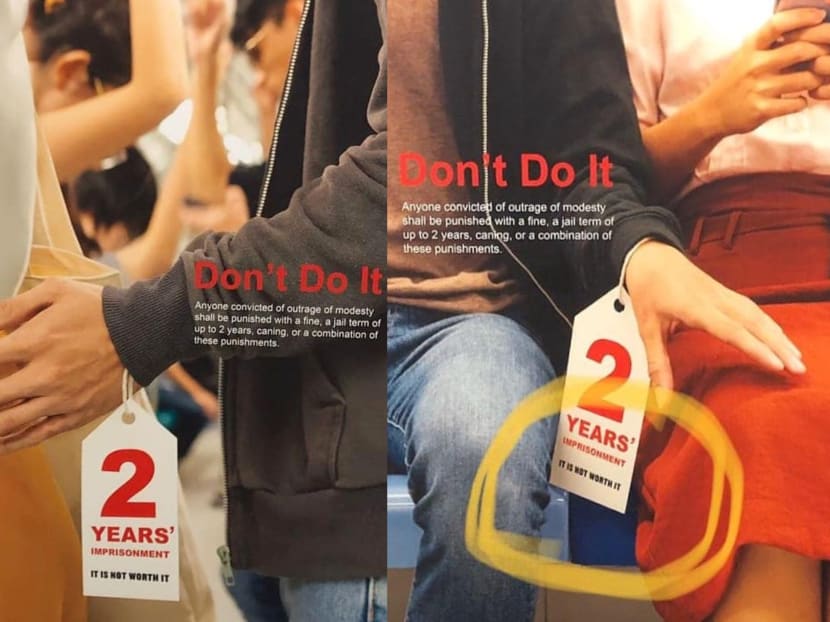Police defend crime prevention posters after Aware takes issue with price tag design
SINGAPORE — A series of posters bearing anti-molestation messages has come into the crosshairs of a woman advocacy group for making sexual violence look like it is a “commodity to purchase and consume”.

The posters, which are displayed in buses and trains, and places on the public transport network, depict a “molester” with a price tag hanging down his wrist with the words “2 years’ imprisonment: It is not worth it”.
SINGAPORE — A series of posters bearing anti-molestation messages has come into the crosshairs of a woman advocacy group for making sexual violence look like it is a “commodity to purchase and consume”.
But the criticism by the Association of Women for Action and Research (Aware) was rebutted by the Singapore Police Force (SPF), which designed the posters in partnership with students from Singapore Polytechnic’s Media, Arts and Design School.
“Aware does not seem to have understood the purpose of the posters,” the SPF said in a Facebook post on Saturday (Nov 16).
The posters, which are displayed in buses and trains, and places on the public transport network, target potential perpetrators and specifically highlight the punishments for committing the crimes to send a “strong deterrent message”, the SPF added.
The posters depict a “molester” with a price tag hanging down his wrist with the words “2 years’ imprisonment: It is not worth it”.
In a Facebook post on Thursday, Aware asked: “What about the price that she (the victim) will have to pay in this scenario, which the poster makes no mention of?”
In response to TODAY’s queries on its post, Aware’s communications manager Kelly Leow said that it is “inappropriate to literally hang a price tag on an act of sexual violence, thereby likening the act to a product or experience that one may purchase to enjoy”.
“Surely that is not how people should view sexual violence — as a consumer good,” she added.
The phrase “2 years’ imprisonment: It is not worth it”, Ms Leow said, begs the question of “what would be ‘worth it’ — six months? Two weeks? It practically invites the viewer to do some mental bargaining, to come up with an ‘appropriate figure’.”
She said that while Aware “fully supports” the central message of the posters, that “molestation is a crime recognised by the state, and that perpetrators will be held accountable for their actions”, it disagrees with how the message is conveyed.
“We think that people should be (and most people are) motivated to not commit sexual violence because of their respect for the bodily autonomy of other human beings.”
POSTERS DESIGNED TO ‘INFLUENCE BEHAVIOUR’: POLICE
But police said would-be offenders might be “unable to exercise self discipline or control themselves”, and the posters were designed to “influence their behaviour by telling them what punishment they may face”.
“Aware’s suggestion, on the other hand, is unlikely to have the intended deterrent effect on such offenders,” the SPF added.
Agreeing, Mr Gerald Singham, chairman of the National Crime Prevention Council, said that it was “never our intention” to downplay the hurt that victims of sexual crime suffer from.
“However, different messages are carried via different platforms and in this instance, we feel that crime prevention messages would be more impactful if it highlighted the personal costs to the perpetrator.”
Explaining the design concept for the posters, a Singapore Polytechnic spokesperson said: “The thought behind it is that this would capture the attention of potential offenders and remind them of the severe consequences of such crimes. This concept was eventually selected by SPF for the latest campaign.”
The SPF said that the objective of these visuals is to prevent such crimes in the first place, by “driving home the point that outrage of modesty is an egregious offence with serious penalties”.
“It is unfortunate that Aware has chosen to make these public judgements against the Police without any attempt to contact us to understand our perspective, despite having worked with us in the past to enhance support to victims of sexual offences,” the SPF added.
On Sunday, Aware clarified that its intention in raising the issue was to “contribute constructively to the ongoing public conversation about sexual violence in Singapore”.
“The post was not targeted at the Singapore Police Force, with whom we have worked and continue to collaborate,” Aware said.
“We also want to recognise that these new posters are a significant improvement from some of the older ‘outrage of modesty’ posters, with taglines like ‘Don’t get rubbed the wrong way’, which seemed to place responsibility of preventing sexual harassment on the potential victim, instead of on the perpetrator.”
However, Aware insisted that the way the message is conveyed is wrong.
“Putting a price on (molestation) likens the victim to an object on a store shelf that can be purchased if one is willing to pay the price,” Aware said.
“The poster does not say that this act is wrong, only that it is expensive. This analogy has the effect of erasing the experience of the victim and any viewer’s empathy for the victim.”
WHAT COMMUTERS THINK
Commuters TODAY spoke to at MRT stations were split as to whether the message on these posters will be effective in deterring crime.

*TODAY's WhatsApp news service will cease from November 30, 2019.
Technician Syed Muzakkir, 26, said that having the punishments laid out might turn would-be offenders away as they might not be swayed if the posters focused only on the moral depravity of the act.
“We shouldn’t (commit acts of indecency) because it’s wrong, not because of the punishment we will get,” he said.
“Maybe in order to prevent the molester from doing this, the punishment (has to be emphasised).”
Some commuters felt that the posters are ineffective in stopping these crimes.
Junior college student Charlieze Tan believes that would-be offenders are already aware of the consequences.
“They already want to do it, they already know it’s wrong and they already know there are consequences but they just don’t care,” said the 17-year-old.
She added that the posters are flawed in “putting a price tag on this crime”.











